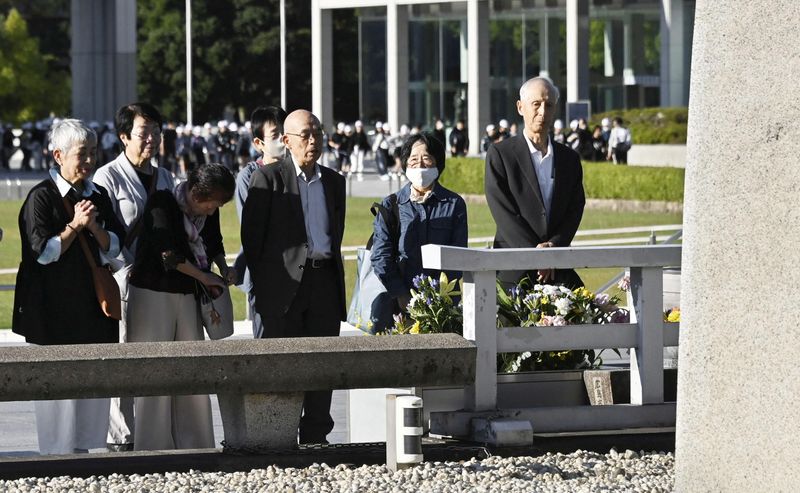By Daniel Leussink
HIROSHIMA, Japan (Reuters) - Having survived the atomic bomb that flattened his hometown of Hiroshima when he was nine months old, Kunihiko Sakuma has never forgotten the stain it left on him in the eyes of some of his fellow Japanese.
Growing up, he constantly heard rumours that survivors carried diseases and their future offspring might be tainted by the radiation from the August 1945 blast.
Sakuma left Hiroshima to seek a new life in Tokyo. He started dating a woman, only to find her mother disapproved of her relationship with him.
Last week's awarding of the Nobel Peace Prize to survivors' organisation Nihon Hidankyo has been seen as a timely reminder for a world many believe has never been closer to nuclear conflict.
But victims and experts are divided over whether the international recognition of those who survived the world's only atom-bomb attacks can help heal the private pain of discrimination and prejudice that they and their families say still lingers.
Nearly one-fifth of Japan's hibakusha, as survivors of the atomic bombings of Hiroshima and Nagasaki are known, said they had faced discrimination, mainly in finding a marriage partner but also in seeking jobs, according to a survey of 13,000 survivors in 2005 by the Asahi newspaper.
"The impact of the bomb was not limited to the tragedy that happened when it was dropped," said Sakuma, 79, a bald, bespectacled man who heads a Hiroshima organisation for A-bomb sufferers.
It has "had a huge impact on people mentally and in many other ways", he told Reuters from his office, filled with maps of the city, newspaper clippings and pamphlets about the blast and its aftermath.
'MONSTERS'
The U.S. bombs that laid waste to Hiroshima and Nagasaki killed tens of thousands instantly, with an estimated 210,000 dead by the end of 1945, while others succumbed to radiation-related health problems in the months and years that followed.
Less discussed is that many survivors were ostracised by their peers and potential employers due to their injuries and spurned by would-be lovers over fears they might pass on genetic deformities.
Survivors exposed to high radiation levels developed cancers and some other diseases at higher rates, but there has been no statistically significant evidence of major birth defects in children of survivors, according to the Radiation Effects Research Foundation, a Japan-U.S. research organisation.
With the roughly 100,000 living hibakusha now an average age of 86, much of the overt discrimination has gone, experts say. But some victims remain ashamed to talk about their past.
"Discrimination still exists to this day, particularly among the older generations or in rural areas, and some hibakusha still get whispers that they're from Hiroshima and feel ashamed," said Yuta Takahashi, director of Katawara, an advocacy group for nuclear disarmament based in Yokohama.
"It's not overt but the fear of being discriminated against also still exists, and some keep their past a secret."
Teruko Yahata, 87, still has a scar on her forehead from when she was knocked over as an eight-year-old when the bomb hit Hiroshima.
While the scar at her hairline is small, many child survivors were left with severe facial injuries, including burns, disfigurement and missing ears. They were taunted and called "monsters" on the playground by other children, she said.
UNRESOLVED ISSUES
Many survivors, such as those in designated blast zones, were entitled to apply for special identity booklets that gave them benefits including free healthcare. Some parents chose not to apply for their children, fearing the documents would become a physical symbol of their difference.
Still others did not qualify for benefits, and many of these ageing survivors feel that is a different form of discrimination.
Last month then-Prime Minister Fumio Kishida, a Hiroshima native who represents the area in parliament, promised medical assistance for some overlooked victims.
Survivor Yahata, speaking to Reuters at the Peace Memorial Museum in central Hiroshima, said the Nobel Prize acclaim might help end the lingering discrimination.
"It can lead people to understand the true nature of the atomic bomb, its cruelty and the sorrow it caused," she said. "Through this, people might come to realise that survivors are not something to discriminate against."
Sakuma, however, said he did not think the prize alone could fully resolve the prejudice he and other survivors have faced.
He returned to Hiroshima in the late 1960s after the relationship with his girlfriend grew strained over her mother's reservations. He later married a woman whose parents had also survived the blast.

As the years have passed, cases of such direct discrimination are now extremely rare, Sakuma said, but Japanese society still needs to reflect on how hibakusha have been treated in order to move on.
"It's an award that suits the current time," he said. "Going forward, I think we need to continue discussing various issues to resolve them."